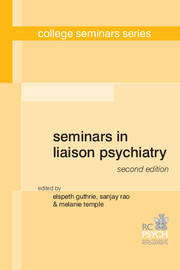Book contents
- Frontmatter
- Contents
- Abbreviations
- List of boxes, tables and figures
- List of contributors
- 1 Basic skills and competencies in liaison psychiatry
- 2 The liaison psychiatry curriculum
- 3 Classification and diagnosis
- 4 Capacity and consent
- 5 Psychological reaction to physical illness
- 6 Medically unexplained symptoms
- 7 Alcohol and substance use in the general hospital
- 8 Accident and emergency psychiatry and self-harm
- 9 Perinatal psychiatry
- 10 General medicine and its specialties
- 11 Liaison psychiatry and surgery
- 12 Neuropsychiatry for liaison psychiatrists
- 13 Psycho-oncology
- 14 Palliative care psychiatry
- 15 Sleep disorders
- 16 Weight- and eating-related issues in liaison psychiatry
- 17 Disaster management
- 18 Liaison psychiatry and older people
- 19 Paediatric liaison psychiatry
- 20 Primary care and management of long-term conditions
- 21 Occupational medicine
- 22 HIV and liaison psychiatry
- 23 Sexual dysfunction
- 24 Psychopharmacology in the medically ill
- 25 Psychological treatments in liaison psychiatry
- 26 Research, audit and rating scales
- 27 Service models
- 28 Developing liaison psychiatry services
- 29 Multiple choice questions and extended matching items
- Appendix 1 Specific competencies
- Appendix 2 Learning objectives with assessment guidance
- Index
10 - General medicine and its specialties
Published online by Cambridge University Press: 02 January 2018
- Frontmatter
- Contents
- Abbreviations
- List of boxes, tables and figures
- List of contributors
- 1 Basic skills and competencies in liaison psychiatry
- 2 The liaison psychiatry curriculum
- 3 Classification and diagnosis
- 4 Capacity and consent
- 5 Psychological reaction to physical illness
- 6 Medically unexplained symptoms
- 7 Alcohol and substance use in the general hospital
- 8 Accident and emergency psychiatry and self-harm
- 9 Perinatal psychiatry
- 10 General medicine and its specialties
- 11 Liaison psychiatry and surgery
- 12 Neuropsychiatry for liaison psychiatrists
- 13 Psycho-oncology
- 14 Palliative care psychiatry
- 15 Sleep disorders
- 16 Weight- and eating-related issues in liaison psychiatry
- 17 Disaster management
- 18 Liaison psychiatry and older people
- 19 Paediatric liaison psychiatry
- 20 Primary care and management of long-term conditions
- 21 Occupational medicine
- 22 HIV and liaison psychiatry
- 23 Sexual dysfunction
- 24 Psychopharmacology in the medically ill
- 25 Psychological treatments in liaison psychiatry
- 26 Research, audit and rating scales
- 27 Service models
- 28 Developing liaison psychiatry services
- 29 Multiple choice questions and extended matching items
- Appendix 1 Specific competencies
- Appendix 2 Learning objectives with assessment guidance
- Index
Summary
Referrals from general medicine and its specialties have provided the bulk of the clinical work for most liaison psychiatry services in secondary care hospitals and this is likely to continue for the foreseeable future. The aim of this chapter is to provide a broad overview of the types of problems that liaison psychiatrists may be referred from medical wards during the course of their work. Many of the other chapters in this book provide more detail about specific problem areas (e.g. alcohol problems, Chapter 7), specific conditions (e.g. medically unexplained symptoms, Chapter 6) or specific competencies (Chapter 1) if required by the reader.
Changing patterns of medical practice
In-patient stays in hospital are much shorter than they used to be. More investigations and interventions are carried out as out-patient or day patient procedures. Medicine has become more specialised during the last two decades and in many hospitals the general medical ward has become obsolete, being replaced by specialised wards. Acute medicine has emerged as a separate specialty (Royal College of Physicians ' Royal College of Psychiatrists, 1995; Royal College of Physicians, 2007), with the result that patients are now often admitted to a short-stay acute medical unit where their presenting symptoms are evaluated before a decision is made as to whether they require further in-patient specialist care or whether they are well enough to be discharged to continue treatment as an out-patient. This decision is usually made within 48 h of admission. The acute medical unit is becoming the hub of all acute medical care within general hospitals. It has been recommended that the acute medical unit develops operational procedures for defining safe and appropriate mental health accommodation and behavioural areas to cater for psychiatrically ill patients who develop acute medical illnesses and for patients with acute medical conditions who develop confusional states. The involvement of a liaison psychiatry team is obviously crucial in planning and managing such units.
- Type
- Chapter
- Information
- Seminars in Liaison Psychiatry , pp. 136 - 150Publisher: Royal College of PsychiatristsPrint publication year: 2012

